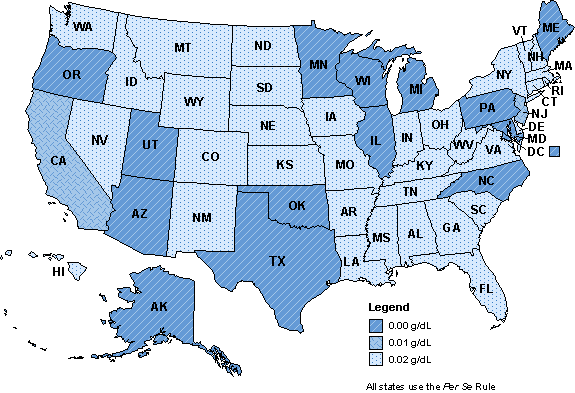 |
||
| Home- | |Facts On Adolescent Binge Drinking | Strategies & Approaches | What You Can Do | Resources & Links | |
|
Strategies and Approaches to Change Policies
|
|||
Strategies & Approaches › Change Policies › Enforce Zero Tolerance Laws for Underage Drinking and Driving |
|||
Enforce Zero Tolerance Laws for Underage Drinking and Driving Every state and the District of Columbia have a “zero tolerance” policy with regard to measurable blood alcohol content for drivers under the age of 21. Young drivers who are found to have a blood alcohol content higher than 0.02 percent can have their license immediately seized and revoked and be subject to significant fines. This enforcement strategy is connected to federal highway dollars to ensure continued state support; variation exists in this policy among the U.S. territories and possessions. Youth Operators Blood Alcohol Concentration Limit Laws as of 1/1/2006
For additional strategies and approaches for changing policies, see the following: What You Can Do: Community References:
Bonnie, R.J. & M.E. O’Connell (eds). 2003. Reducing Underage Drinking: A Collective Responsibility. The National Academies Press, Washington, D.C. Bonnie, R.J. & M.E. O’Connell (eds). 2003. Reducing Underage Drinking: A Collective Responsibility. The National Academies Press, Washington, D.C. A Guide to Zero Tolerance and Graduated Licensing: Two Strategies that Work. Pacific Institute for Research and Evaluation. Available at: http://www.udetc.org/documents/Guide2zero.pdf#search=%22a%20guide%20to%20zero%20tolerance%20and%20graduated%20licensing%22. Accessed on [09/06/06] Office of Applied Studies. 2004. Substance Abuse and Mental Health Services Administration. NSDUH Report: Alcohol Dependence or Abuse and Age at First Use. Rockville, MD: Substance Abuse and Mental Health Services Administration. A Guide to Zero Tolerance and Graduated Licensing: Two Strategies that Work. Pacific Institute for Research and Evaluation. Available at: http://www.udetc.org/documents/Guide2zero.pdf#search=%22a%20guide%20to%20zero%20tolerance%20and%20graduated%20licensing%22. Accessed on [09/06/06] A Guide to Zero Tolerance and Graduated Licensing: Two Strategies that Work. Pacific Institute for Research and Evaluation. Available at: http://www.udetc.org/documents/Guide2zero.pdf#search=%22a%20guide%20to%20zero%20tolerance%20and%20graduated%20licensing%22. Accessed on [09/06/06] A Guide to Zero Tolerance and Graduated Licensing: Two Strategies that Work. Pacific Institute for Research and Evaluation. Available at: http://www.udetc.org/documents/Guide2zero.pdf#search=%22a%20guide%20to%20zero%20tolerance%20and%20graduated%20licensing%22. Accessed on [09/06/06] Underage Drinking Prevention Action Guide and Planner. 2001. Center for Substance Abuse Prevention. Available at: http://media.shs.net/prevline/pdfs/phd858.pdf#search=%22underage%20drinking%20prevention%20action%20guide%20and%20planner%22. Accessed on [08/25/06] A Guide to Zero Tolerance and Graduated Licensing: Two Strategies that Work. Pacific Institute for Research and Evaluation. Available at: http://www.udetc.org/documents/Guide2zero.pdf#search=%22a%20guide%20to%20zero%20tolerance%20and%20graduated%20licensing%22. Accessed on [09/06/06] Environmental Strategies to Prevent Alcohol Problems on College Campuses. 2005. Pacific Institute for Research and Evaluation. Available at: http://www.udetc.org/documents/EnviroStrat.pdf#search=%22strategies%20to%20promote%20alcohol%20free%20events%22. Accessed on [08/29/06] Johnson, K.D. Underage Drinking: Problem-Oriented Guides for Police Problem-Specific Guides Services. U.S. Dept. of Justice. Available at: http://www.popcenter.org/problems/PDFs/underage.pdf#search=%22statistics%20on%20alcohol%20free%20events%20and%20underage%20drinking%22. Accessed on [09/01/06] Drinking in America: Myths, Realities, and Prevention Policy. U.S. Dept. of Justice. Available at: http://www.udetc.org/documents/Drinking_in_America.pdf. Accessed on [09/05/06] The Relationship Between Alcohol Availability and Injury and Crime. Available at: http://www.alcoholpolicymd.com/alcohol_and_health/alc_availability.htm. Accessed on [01/09/06] Bans of Off-Premises Sunday Sales. Alcohol Policy Information System. Available at: http://www.alcoholpolicy.niaaa.nih.gov/index.asp?Type=BAS_APIS&SEC={1215CDC3-980E-4868-87FB-524C3A1EC415}. Accessed on [09/28/06] |
